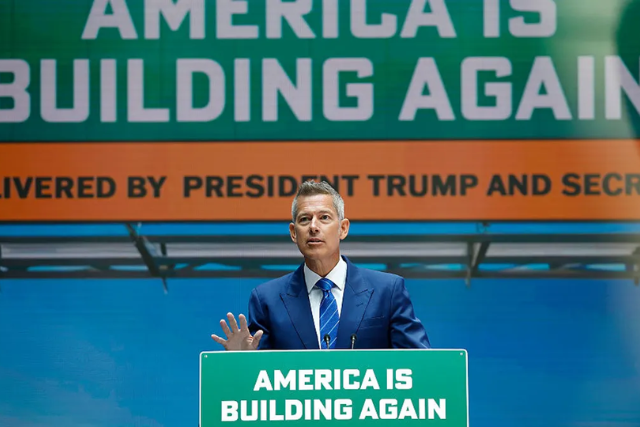
The Trump administration is ramping up its push to overhaul the nation’s infrastructure priorities, with an emphasis on faster project delivery and fewer regulatory hurdles. Speaking at an infrastructure conference last week, Transportation Secretary Sean Duffy laid out the White House’s latest plans to modernize how projects get approved and built.

“We want to streamline the rules and regulations around what you do as much as possible,” Duffy told attendees Thursday, setting the tone for Congress’s upcoming debate on Surface Transportation Reauthorization later this year.
At the event, Duffy signed an agreement with the Texas Department of Transportation, granting it greater control over its own environmental permitting. The move is meant to serve as a pilot for other states to assume more responsibility under the National Environmental Policy Act (NEPA), which Duffy says has grown too costly and time-consuming.
“Driving project delivery efficiencies through regulatory streamlining is one of the top priorities [of the DOT],” Duffy emphasized in a letter to governors nationwide, urging them to consider taking on NEPA responsibilities themselves.
The Department of Transportation also announced $488 million in BUILD program grants, which will fund 30 projects, including bridge upgrades, new highway sections, and flood resilience infrastructure across the country. Duffy said these grants are part of the administration’s “America is Building Again” agenda, which focuses on safety improvements, faster project timelines, and boosting private sector investment.

“Enhancing transportation safety, accelerating project delivery by reforming NEPA and enhancing One Federal Decision — this is how we build faster and smarter,” Duffy said.
During a congressional hearing last week, Duffy reinforced that the bedrock NEPA law needs updating to prevent delays that hamper vital infrastructure. He noted the DOT’s unique authority to test new approaches for faster permitting and procurement.
When Rep. Daniel Webster (R-Fla.) asked whether routine rail maintenance should qualify for categorical NEPA exclusions, Duffy agreed: “That’s a broad question, but with balance, yes, I do think they should fall under categorical exclusion.”
As lawmakers consider what a new surface transportation bill will look like once the current Infrastructure Investment and Jobs Act expires in 2026, Duffy said he wants to consolidate and simplify the department’s complex grant system.
“We have like 12 different programs in regard to grants… We want to consolidate so you can have a dashboard to see where your grants are and how fast they’re moving,” Duffy told lawmakers.
Some representatives raised broader concerns during the hearing. Rep. Chris Pappas (D-N.H.) questioned the DOT’s ability to deliver projects effectively amid staff cuts that have reduced the Federal Highway Administration’s workforce by over a quarter since May.
Duffy acknowledged the challenge but defended the cuts: “We’re trying to do more with less… If we’re ineffective and need more people on board, I’ll bring them in.”
Other lawmakers pressed Duffy on whether the administration’s push to remove Biden-era diversity, equity and inclusion initiatives would impact programs for small and disadvantaged businesses. Rep. Jesus Garcia (D-Ill.) called for continued support for the Disadvantaged Business Enterprise program and the Small Business Transportation Resource Centers.
Duffy countered that race- and sex-based preferences were “not constitutional.”
The session also touched on rail projects, with Duffy reiterating that he supports viable high-speed rail corridors if they can demonstrate clear returns on federal investment. He noted the DOT plans to pull back billions in unused grants from California’s high-speed rail program and remains cautiously open to projects like the proposed LA–Las Vegas and Dallas–Houston connections.
In a sign that funding conditions may tighten, Rep. Dusty Johnson (R-S.D.) said he plans to propose a bill banning federal transportation funds for states that do not comply with Immigration and Customs Enforcement. Duffy agreed: “I couldn’t agree with you more… the federal taxpayer should not come back and then rebuild that when they allow it to be destroyed.”
Looking ahead, the DOT is seeking public input on its next surface transportation priorities through a newly published Request for Information, which aims to shape the nation’s core infrastructure policy for years to come.
Originally reported by Julie Strupp in Construction Dive.